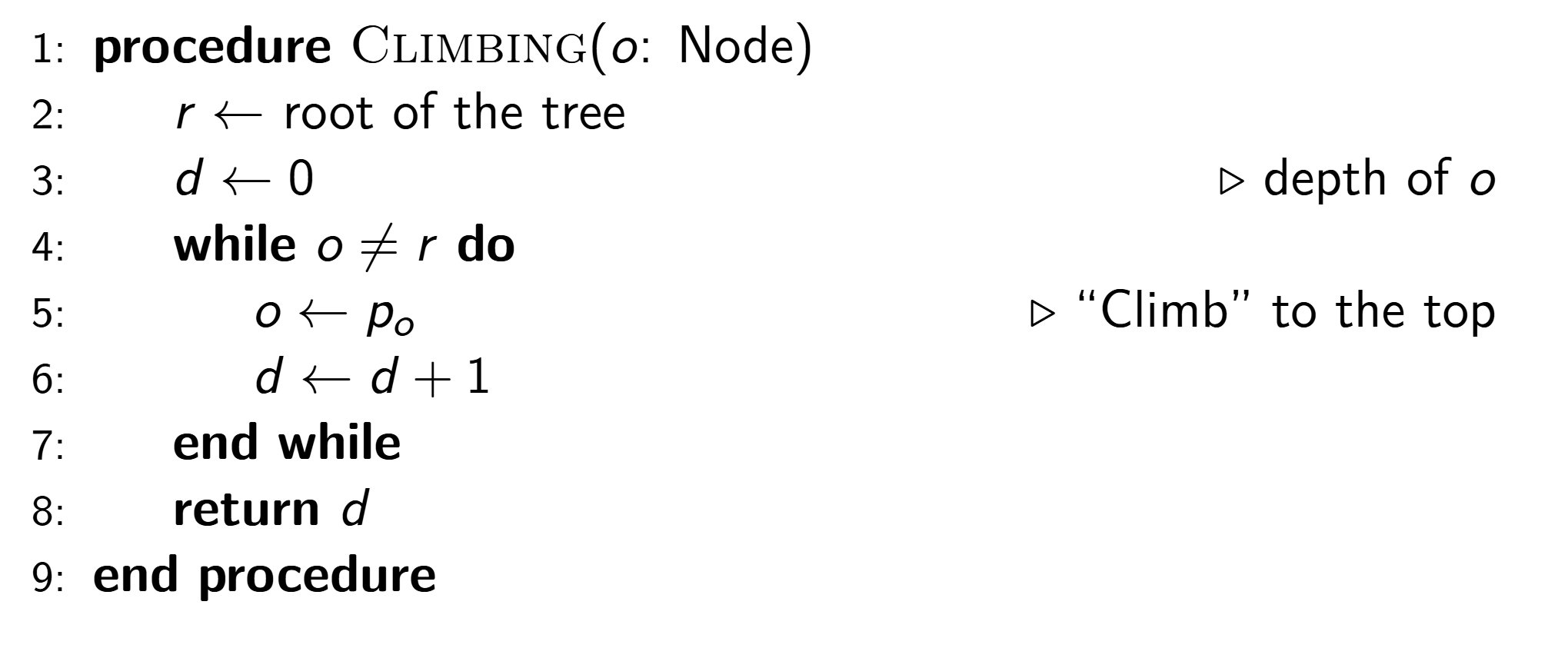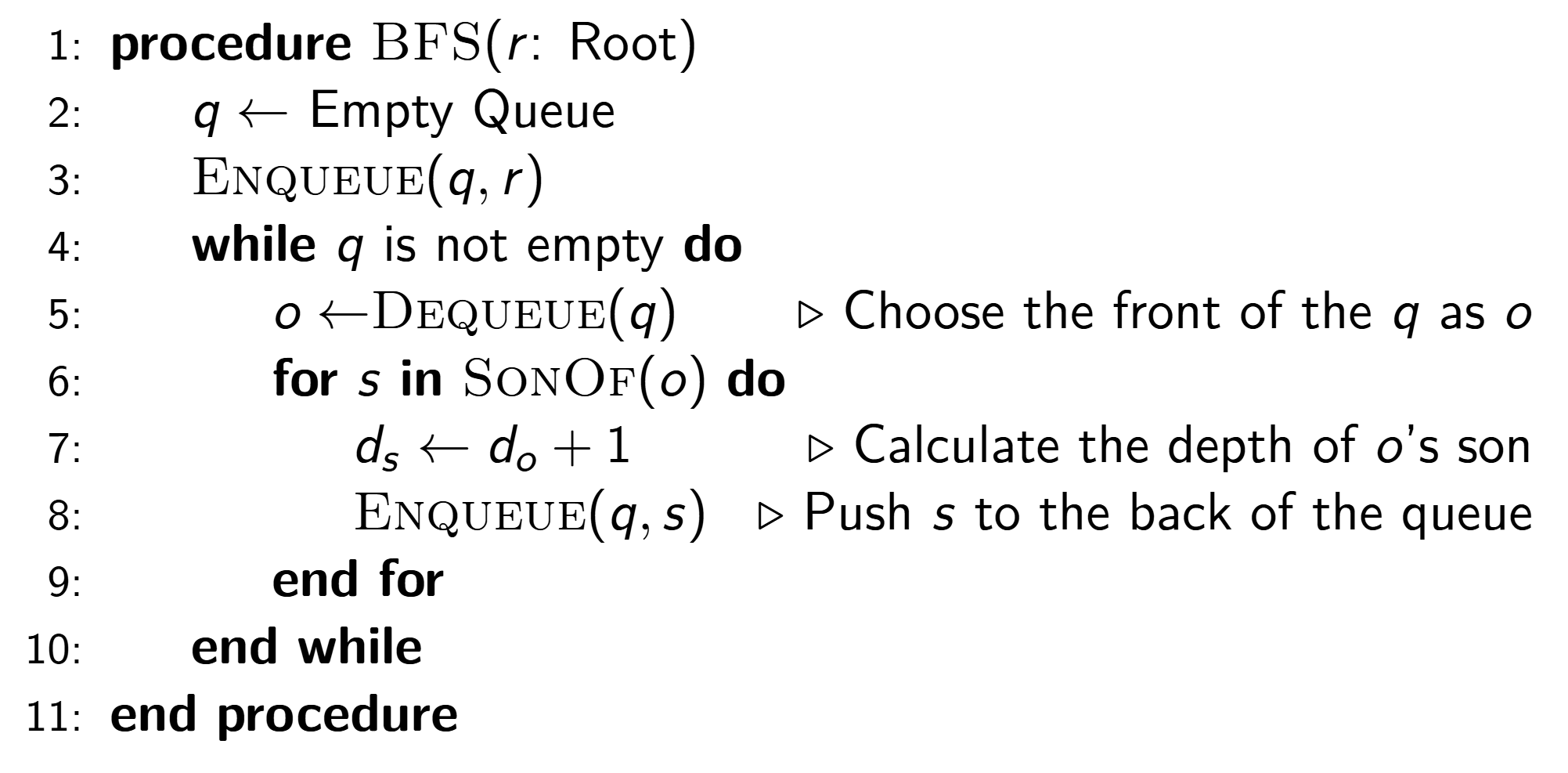B - Tree 2
30 pts? 60 pts!
Idea: for all nodes, “climbing” to the root

This algo actually earns 60 pts!
Because the tree generated randomly using \(p_i = \text{rand}(1, i-1)\) has an expected depth of \(\mathcal{O}(\log n)\).
The proof will be at the end of the solution.
-
#include <functional> #include <iostream> #include <vector> class Solution { public: static std::vector<int> solve(int n, const std::vector<int> &parents) { std::vector<int> depth; for (int i = 0; i < n; ++i) { int current = i; int d = 0; while (current != 0) { current = parents[current - 1] - 1; d++; } depth.push_back(d); } return depth; } }; int main() { std::ios::sync_with_stdio(false); std::cin.tie(nullptr); std::cout.tie(nullptr); int n; std::cin >> n; std::vector<int> parents; parents.reserve(n - 1); for (int i = 1; i < n; ++i) { int parent; std::cin >> parent; parents.push_back(parent); } auto result = Solution::solve(n, parents); for (int i = 0; i < n; ++i) { std::cout << result[i] << " "; } return 0; }
100 pts
DFS and BFS is a good idea for most of the tree problem, because this method allows the entire tree to be traversed in a specific order.
In both types of search, the parent node always arrives before the child nodes.
So, if we let \(d_i\) be the distance of node \(i\), during our DFS/BFS, \(d_{p_i}\) is always computed before \(d_i\).
Here is the pseudocode for DFS:

Here is the pseudocode for BFS:

-
import sys sys.setrecursionlimit(10**8) class Solution: @staticmethod def solve(n: int, parents: list[int]) -> list[int]: children = [[] for _ in range(n)] for i in range(1, n): children[parents[i - 1] - 1].append(i) depth = [0] * n def dfs(u: int): for v in children[u]: depth[v] = depth[u] + 1 dfs(v) dfs(0) return depth if __name__ == "__main__": n = int(input()) parents = list(map(int, input().split())) depth = Solution.solve(n, parents) print(*depth) -
#include <stdio.h> #include <stdlib.h> void solve(int n, int *parents, int *depth); int main() { int n; scanf("%d", &n); int *parents = (int *)calloc(n - 1, sizeof(int)); for (int i = 1; i < n; ++i) { scanf("%d", &parents[i - 1]); } int *depth = (int *)calloc(n, sizeof(int)); solve(n, parents, depth); for (int i = 0; i < n; ++i) { printf("%d ", depth[i]); } printf("\n"); free(depth); free(parents); return 0; } #define INIT_CAPACITY 5 struct ArrayList { int num; int capacity; int *data; }; void array_list_init(struct ArrayList *array_list) { array_list->num = 0; array_list->capacity = INIT_CAPACITY; array_list->data = (int *)calloc(array_list->capacity, sizeof(int)); } void array_list_add(struct ArrayList *array_list, int value) { if (array_list->num == array_list->capacity) { array_list->capacity *= 2; array_list->data = (int *)realloc(array_list->data, array_list->capacity * sizeof(int)); } array_list->data[array_list->num++] = value; } void array_list_free(struct ArrayList *array_list) { free(array_list->data); } #undef INIT_CAPACITY void dfs(int u, struct ArrayList *children, int *depth) { for (int i = 0; i < children[u].num; ++i) { depth[children[u].data[i]] = depth[u] + 1; dfs(children[u].data[i], children, depth); } } void solve(int n, int *parents, int *depth) { struct ArrayList *children = (struct ArrayList *)calloc(n, sizeof(struct ArrayList)); for (int i = 0; i < n; ++i) { array_list_init(&children[i]); } for (int i = 1; i < n; ++i) { array_list_add(&children[parents[i - 1] - 1], i); } dfs(0, children, depth); for (int i = 0; i < n; ++i) { array_list_free(&children[i]); } free(children); } -
#include <functional> #include <iostream> #include <vector> class Solution { public: static std::vector<int> solve(int n, const std::vector<int> &parents) { std::vector<std::vector<int>> children(n); for (int i = 1; i < n; ++i) { children[parents[i - 1] - 1].push_back(i); } std::vector<int> depth(n, 0); std::function<void(int)> dfs = [&](int u) { for (int v : children[u]) { depth[v] = depth[u] + 1; dfs(v); } }; dfs(0); return depth; } }; int main() { std::ios::sync_with_stdio(false); std::cin.tie(nullptr); std::cout.tie(nullptr); int n; std::cin >> n; std::vector<int> parents; parents.reserve(n - 1); for (int i = 1; i < n; ++i) { int parent; std::cin >> parent; parents.push_back(parent); } auto result = Solution::solve(n, parents); for (int i = 0; i < n; ++i) { std::cout << result[i] << " "; } std::cout << std::endl; return 0; } -
import java.util.ArrayList; import java.util.List; import java.util.Scanner; class Solution { static void dfs(int u, List<Integer>[] children, int[] depth) { for (int v : children[u]) { depth[v] = depth[u] + 1; dfs(v, children, depth); } } static int[] solve(int n, int[] parents) { int[] depth = new int[n]; @SuppressWarnings("unchecked") List<Integer>[] children = new ArrayList[n]; for (int i = 0; i < n; i++) { children[i] = new ArrayList<>(); } for (int i = 1; i < n; i++) { children[parents[i - 1] - 1].add(i); } dfs(0, children, depth); return depth; } public static void main(String[] args) { Scanner scanner = new Scanner(System.in); int n = scanner.nextInt(); int[] parents = new int[n - 1]; for (int i = 1; i < n; i++) { parents[i - 1] = scanner.nextInt(); } int[] depth = solve(n, parents); for (int i = 0; i < n; i++) { System.out.print(depth[i] + " "); } scanner.close(); } }
Proof of expected depth of \(\mathcal{O}(\log n)\)
Let
\[d_i = \mathbb{E}[\text{depth of node } i]\]As \(p_i \sim \text{uniform}(1, i-1)\), we can have
\[\begin{aligned} d_i &= \mathbb{E}_{p\sim \text{uniform}(1, i-1)}\left[d_{p} + 1\right] \\ &= \mathbb{E}_{p\sim \text{uniform}(1, i-1)}\left[d_{p}\right] + 1 \\ &= 1 + \frac{1}{i-1}\sum_{p=1}^{i-1}d_p\\ &=1 + \frac{1}{i-1} d_{i-1} + \frac{1}{i-1} \sum_{p=1}^{i-2}d_p \end{aligned}\]As
\[d_i = 1 + \frac{1}{i-1}\sum_{p=1}^{i-1}d_p\]so
\[\sum_{p=1}^{i-1}d_p = (i-1)(d_p-1)\]Thus
\[\begin{aligned} d_i&=1 + \frac{1}{i-1} d_{i-1} + \frac{1}{i-1} \sum_{p=1}^{i-2}d_p\\ &=1 + \frac{1}{i-1} d_{i-1} + \frac{1}{i-1}\cdot (i-2) (d_{i-1} - 1)\\ &=\frac{1}{i-1} + d_{i-1} = \sum_{j=1}^{i-1}\frac{1}{i} \end{aligned}\]So
\[\mathbb{E}[\text{depth of node } i]=\sum_{j=1}^{i-1}\frac{1}{i}\]And this is a very famous formula called Harmonic series.
It can be easily proved that
\[\mathbb{E}[\text{depth of node } i]=\sum_{j=1}^{i-1}\frac{1}{i}\le 1 + \int_1^{i-1}\frac{1}{x}\mathrm{d}x=1+\log (i-1)\]